- Home
- Jack Kerouac
Vanity of Duluoz Page 18
Vanity of Duluoz Read online
Page 18
IV
And it was that last morning before we got ready to sail to Brooklyn that I devised the idea of ‘The Duluoz Legend’, it was a gray rainy morning and I sat in the purser’s office over his typewriter, he was having his last drunk I guess, and I saw it: a lifetime of writing about what I’d seen with my own eyes, told in my own words, according to the style I decided on at whether twenty-one years old or thirty or forty or whatever later age, and put it all together as a contemporary history record for future times to see what really happened and what people really thought.
Naturally, it was a good thing I wasnt chosen to give the valedictory speech of Lowell High School when I graduated from that other mill.
So we lift anchor and sail out, across the Irish Sea, in a storm now, she’s as green as snot God help me just like Joyce said, and then around that firth again, and out into the Atlantic with nothing between us and Great Britain but the BBC coming over faintly on the radio.
And a giant storm hits up, ‘huee huee’ the submarines are attacking, the waves are smashing against the side of the Weems so strong we dont know what can ever be done about lowering away our life boats. We’re empty of bombs now, light, bobbing around up and down, but it’s too rough to survive if our ship gets hit in the poor almost human iron bulkheads and a virile German torpedo enters her and sinks her, us bobbing corks will freeze to death anyway (far north our route) so we just sit glumly in the galley, the whole deck and steward’s crew, wearing our life belts, sucking on coffee, playing checkers, making cocoa, and the Negro second cook whips on an extra life jacket and yells ‘Well, I dont know about you fellas but I’M gettin outa here’ and he runs on deck alone.
‘Where’s he gonna go?’ says the bosun moving a checker which slides with the ship’s pitch.
‘There aint no place to go,’ I say, adding my last six words to the four I’d already put in on the trip out.
Nobody even looks up.
Du Louse picked a wrong time to talk.
But we got outa that okay, took a left at Iceland, and got back to Brooklyn, the Moore-McCormack piers at the foot of Joralemon Street where you can see the towers of Manhattan right across the river all lit up at dusk and all those narrow byways among the canyons of concrete that show you the way to restaurants, blondes, fathers and mothers, friends, lovers, warmth, city, weddings, parades, flags, beery salons . . .
V
And bang, we all get paid in little brown envelopes and I unloose about a hundred thousand words on all those poor shipmates of mine because somebody’s brought beer aboard and I’m drunk and they complain ‘That goddam Du Louse aint said ten words on the whole trip now listen to him!’
‘I’m going to see my baby!’ I yell and rush off across the unroasted coffee sour sweet smell of the wharf and into the streets and up to Borough Hall and into the cinnamon-smelling subway and up thru Times Square and up to Columbia campus, in a mist of rains, and run to the pad Johnnie’s already sharing with June and jump in, now it’s raining dogs, and not seadogs either, and there she is, radiant and happy to see me and young and she was the wife of my youth.
And that old seadog June had already been instructing her all summer, while I was at sea, how to please me at love.
So we pull the shade down on the rain and retire by candlelight after our favorite snack of cold asparagus with mayonnaise and ripe olives.
VI
Then I went home to Ozone Park to see Ma and Pa, at the time the song was ‘People Will Say We’re in Love’, it was cold October in Brooklyn as Ma had me wait in the corner as she ran in to shop for something in Abraham & Straus, and to get Barricini candy for Pa, we took the joyous Els, subways, somehow things were grand and forward-looking. Pa was in high spirits and said he still had his sea legs. I brought Johnnie home to meet him and we had beers in the German tavern on Liberty Avenue and Cross Bay Boulevard and then walked home all four, the two couples arm in arm, under the October moon and mild falling leaves.
Allegro, the composer should write here.
My next plan was to take a bus to New Orleans and sail out of there, in a few months, but during the winter I intended to commute back and forth from Johnnie’s to Ma’s, at Johnnie’s I wrote a lot, at Ma’s house too, and also get the fill of life.
Johnnie and I took a train to Groose Pointe Michigan to meet her aunt and her father, who was a widower, but when I saw this old bum in a battered coat and battered hat coming up the street I thought ‘No wonder, Missus Palmer married an old bum.’ But he said ‘Come on’ to me and Johnnie and we followed him to his car, where he took off his battered coat and underneath it he had a tuxedo and drove us to a steamed clam dinner on the Lake St Clair shore. Then he took us yatching on his motordriven yatch (35 feet long I forget the make or type) to Ontario across Lake St Clair where we went ashore and picked fresh mint to sprinkle on our steak in the galley that night. He had his mistress with him. We had Hudson Bay blankets to wrap up in our separate foc’sles. One time he’d got drunk with his best friend the mogul or magnate of the hotel system very famous then, but they were drunk, alone, no women, just bottles, so they ordered some mannikins from a Detroit department store and took the models’ legs and had them sticking out of portholes of the yatch and went sailing like that, putt putt putt, in front of everybody’s horrified eyes, out to water clear.
And there were big wild parties of the teenage troupes of that time in various houses around Grosse Pointe, the doorbell rings and a guy yells ‘Hey a beer wants to come out of the icebox,’ I went backstage to the backyard through the screen door and looked at the stars and listened to the revelry and shure did love America AS America in those days.
VII
I’m not talking in detail about my women, or ex-women, in this book, because it’s about football and war, but when I say ‘football and war’ I have to go a step further now and add: ‘Murder.’ One step leads to another in a way but I had nothing to do with this murder. Or did I?
It’s just that a very strange screw of events began to turn in early 1944.
To get to it, I’ll just preamble by saying that in the month of May 1944 I did take a bus to New Orleans, went down to the NMU hall to sign on for a ship, had no luck, hung around the seaman’s club, at one point got drunk with a drunken seaman who used to be the Governor of the State of Florida (we drank under rotating ceiling fans) and walked up and down Magazine Street trying to make a lunchcart waitress, wrote notes to Johnnie telling her I was starving and send money, wrote home, became completely disgusted and decided to go back to New York to ship out from there as usual, or Boston. It was just a nutty subliminal desire to see New Orleans and the South, Mississippi and Alabama and all that, which I saw out the window, the cottonpickin shacks miles and miles of em across those flats. I also got drunk in Asheville North Carolina with Tom Wolfe’s drunken old brother right there in the parlor of Tom Wolfe’s Asheville home with the picture of Tom and of his brother ‘Ben’ right there on top of the squareback piano, and spent that night mooning around with a recalcitrant or miscreant miss on a porch in the Smokies foothill night right there by the Broad River mists. (French Broad, that is.) And skirmishes with women in Raleigh, etc., and another trip in Washington DC and same parks, etc., but the main point is, the whole trip was foolish and I came back real quick and took off my black leather jacket in Johnnie’s bedroom while she was still at art class studying with the famous George Grosz, and just went to bed. When she got home she whooped when she saw my jacket on the back of the chair.
She hadnt ever read Ovid but she sure knew all his advice about riding that pony. (Ovid, Art of Love, Bk III.)
And then sad nights, rain drumming on the roof, six flights up, on 118th Street and Amsterdam just about, and in start coming the new characters of my future ‘life’.
VIII
There was this kid from New Orleans called Claude de Maubris who was born in Eng
land of a French viscount now in the consular service, and of an English mother, and who now lived with his grandmother in a Louisiana estate whenever he was there, which was seldom, blond, eighteen, of fantastic male beauty like a blond Tyrone Power with slanted green eyes and the same look, voice, words and build, I mean by words he expressed his words with the same forcefulness, a little more like Alan Ladd actually, actually like Oscar Wilde’s model male heroes I s’pose but anyway he showed up on the Columbia campus at this time followed by a tall man of 6 foot 3 with a huge flowing red beard who looked like Swinburne.
I forgot to mention that during the winter of 1943 and 1944 I had worked at odd jobs for extra money, including of all things a job as switchboard operator in the little local campus hotels, then later as script synopsizer for Columbia Pictures on Seventh Avenue downtown, so on my return trip from New Orleans I was planning to get one of those jobs back while waiting for a ship. It so happened that this Claude got a room in Dalton Hall, small campus hotel, so did Swinburne, I knew the management there, and that was to be the focal point of most of these events.
Well, turns out Claude arrives on the campus one warm afternoon for the second semester as freshman at Columbia and immediately runs into the library so he can play some Brahms records free in the listening booth. Swinburne’s right behind him but Angel Boy tells him to wait outside so he can listen to the music undisturbed with his earphones and think. Very intelligent kid of an order you’ll see later. But point is, the professor of French Classics at Columbia University at the time, Ronald Mugwump I guess he was, a little fud of some kind I never saw, or cared to look at, ran into the booth where Claude was and said something like ‘Where did you come from, you marvelous boy?’ You can see what was happening to this kid. And the scene.
Because talk about your Folies Bergère late 1890s fin de siècle dray-mas, this was the yellow pages of not only Tristan de Peradventure (whoever he was or will be) but the very yellow decadence of Beardsley, Dowson, Aleister Crowley and the rest. I knew nothing of this at the time. It just turned out that my Johnnie’s apartment became the focal point of meetings for the wild outré gang of Columbia campus. First she tells me there’s this wild new young kid hanging around the West End Bar called Claude who is blond and beautiful and strong and intelligent and comes over to her place to take showers but doesnt try to make her. Strangely, I believe her, and turns out it’s true. He’s just chased so much he has to hide somewhere, and being a Southern ‘scion’ of rich family, as she is, and needing the hearty companionship of a good gal protector, he comes there. He finally starts bringing around his girl the rich girl from Westport, Cecily. Finally I first see him in the West End Bar after waking up from my long nap.
‘There he is, there’s that marvelous Claude.’
‘Looks to me like a mischievous little prick,’ I said to Johnnie, and I still think so. But he was okay. He wanted to ship out again, had been a seaman out of New Orleans, maybe ship out with me. He was no fairy and he was strong and wiry and that first night we got really drunk and I dont know whether it was that first night or not, it was, when he told me to get into an empty barrel and then proceeded to roll the barrel down the sidewalks of Upper Broadway. A few nights later I do remember we sat in puddles of rain together in a crashing downpour and poured black ink over our hair . . . yelling folk songs and all kinda songs, I got to like him more and more.
His ‘Swinburne’ had been a boy scout master in Texas, name of Franz Mueller, who first saw Claude when he joined the boy scouts innocently, wanted to go out in the woods and have fun with camps and scout knives and something to do, fourteen. The scoutmaster fell in love with the boy scout, as usual. Now I’m not a queer, and neither is Claude, but I’ve got to expand this queer tale. Franz, not a bad guy in himself by the way, had first spent several years in Paris in about 1936 or so and met a young fourteen-year-old French boy who looked exactly like Claude, had fallen in love with him, tried to make him, or corrupt him, or whatever the French or Greeks say, and was deported from France outright after some kind of investigation. Coming back to America and getting a job as a scoutmaster on weekends, while during the week an instructor in a Louisiana college, who does he see but the same kid, only not French but Anjou French aristocrat boy? He goes crazy. Claude is sent by his rich grandmother to prep school at Andover School right outside Lowell Mass., is followed by red-bearded Swinburne, they throw big parties, Claude is ejected from Andover and doomed forever from going to Yale. He then tries another school. Franz follows him. It isn’t that Claude wants Franz to follow him, or that he wants to turn him away, it’s just a lot of fun, like one night in Bangor Maine Claude gets aboard the Whitlaw yatch with Kenny Whitlaw (acquaintance of Johnnie’s) and they, fifteen, simply pull the plug out and sink the yatch and swim ashore. Pranks and stuff like that. A wild kid. A guy in New Orleans lends him his car, and Claude, fifteen, no license, nothing, wrecks it utterly on Basin Street.
What’s amazing about him is his absolute physical male and spiritual, too, beauty. Slant-eyed, green eyes, complete intelligence, language pouring out of him, Shakespeare reborn almost, golden hair with a halo around it, old queens when they saw him in Greenwich Village bars wrote odes to him starting ‘O fair-haired Grecian lad’. Naturally all the girls went for him, too, and even this old dreamy hardhearted seaman and footballer, Jack, got to like him and drop tears over him.
I remember meeting a fella from Virginia gentry once told me all them New Orleans boys had tragedy written in their hearts. Even Negroes from New Orleans aint got too much luck, like Jelly Roll Morton’s luck shows (invents jazz and dies broke), or poor white boys like Big Slim, but what better luck is there than Louis Armstrong’s?
Anyway, the old Classical prof runs in there and wants to know all about Claude, who’s trying to listen to Brahms, Franz has to run in and rescue him, by some hook or crook Claude meets Johnnie and finds he can literally (that means really) hide out in her pad. And when I’m back with my black leather jacket from New Orleans, it makes no difference, he’s been sleeping on the couch all the time anyway with Cecily. So begins our kind of apartment club.
He looks at me and says ‘You’re trying to write all the time but every time I see that you cant think of what to write, you look constipated.’
I give him the sidelook.
He comes in thru the roof, that is, from the roof down the fire escape, in the rainy night, with gunshots and shouts below. ‘What’s that?’
‘Some kind of error, a fight in the bar, cops chasing, I ran over fences, you know I cant hurt anybody I’m too small . . . Now I’ll sleep. Then I’ll take a shower. Trouble with you Duluoz is, you’re a hardhearted mean old tightfisted shitass no good Canuck who shoulda had his ass froze in the hearts of Manitoba where you and your bad blood belong, you Indian no-good bully.’
‘I’m no bully.’
‘Well bully for you, give me a drink.’
I saw he was trying to cow me with his language as he wasnt about to start with anything else in those days. But then I saw he was seein flaws in me I shoulda seen myself. But then I saw he was just a mischievous little prick.
So, books everywhere, he’s actually attending classes at Columbia, when he hears my stories about Piccadilly in London he orders me more or less to write his composition paper for English composition, which I do, a story about some of the adventures there, and he gets an A the rat. He says ‘My grandfather invented the steamer trunk and I s’pose your grandfather put potatoes in em.’
‘Yep.’ But he looks at me sideways because he can see what’s behind all of that, going back beyond the potatoes and Canada, to, yes, Scotland and Ireland and Cornwall and Wales and Isle of Man and Brittany. Celts can spot each other. Pronounce that.
IX
Also, as he’s interested in symbolistic art, Surrealism not so much, but, say, Modigliani, the French Impressionists, all that darkness of my night-sea life seem
s to disappear and in the spring sunshine it seems that colors are being splashed over my soul. (Now that sounds like Swinburne!)
Anyway, one afternoon he and Johnnie are off to study nude models with George Grosz, they’d asked me to try it one afternoon, I went there and sat there as all the kids sketched and George Grosz talked, and there she was, a naked brunette looking me right in the eye and I had to leave and say to Claude at the door: ‘What do you think I am?’
‘What’s that, a voyeur old boy?’ And so they’re out doing that and I’ve taken a shower and the door of Johnnie’s apartment knocks and I open it and there’s a tall thin fella in a seersucker jacket, with Franz Swinburne behind him. I say ‘What?’ Swinburne, already talked to me in the bar with Claude, says:
‘This is the Will Hubbard they were telling you about, from out west?’
‘Well.’
‘He’s spent a lot of time in New Orleans too, in other words, old friend of mine and Claude’s. Just wants to ask you about how to ship out in the Merchant Marine.’
‘Not in the service?’
‘Oh no,’ says Will looking around with a toothpick in his mouth, and removing it to give me the once-over, ‘just 4-F, phnunk.’ ‘Phnunk’ is where he blows out of his nose a kind of sinus condition, and also English lord expression, as his name is very old.
X
Someday, in fact, I’ll write a book about Will, just by himself, so ever onward the Faustian soul, so especially about Wilson Holmes Hubbard I dont have to wait till he dies to complete his story, he above all’s best left marching on with that aggressive swing of his arms thru the Medinas of the world . . . well, a long story, wait.
But in this case he’s come to see me about Claude, but saying it’s about the Merchant Marine. ‘But what was your last job?’ I ask.

 Tristessa
Tristessa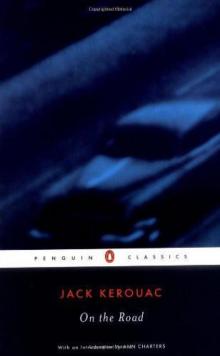 On the Road
On the Road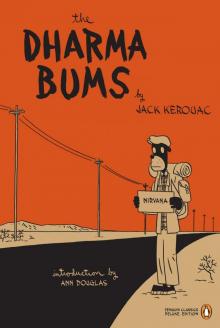 The Dharma Bums
The Dharma Bums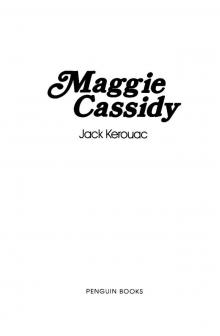 Maggie Cassidy
Maggie Cassidy Big Sur
Big Sur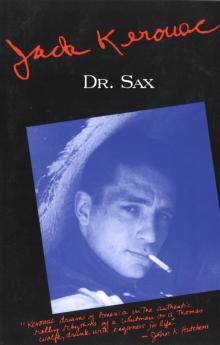 Dr. Sax
Dr. Sax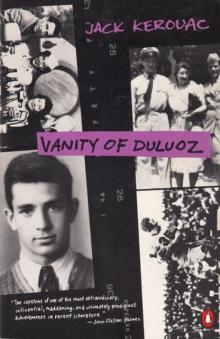 Vanity of Duluoz: An Adventurous Education, 1935-46
Vanity of Duluoz: An Adventurous Education, 1935-46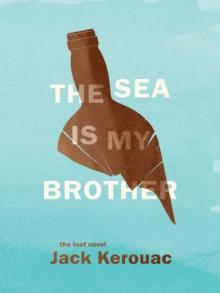 The Sea Is My Brother
The Sea Is My Brother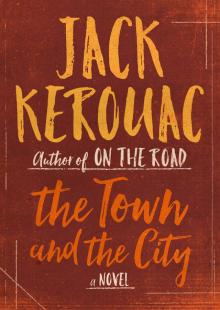 The Town and the City: A Novel
The Town and the City: A Novel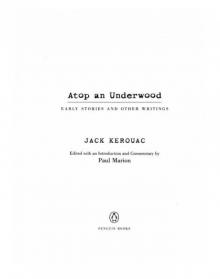 Atop an Underwood: Early Stories and Other Writings
Atop an Underwood: Early Stories and Other Writings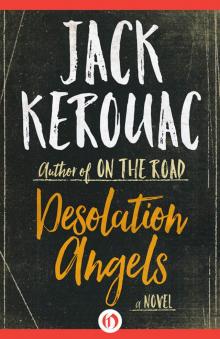 Desolation Angels: A Novel
Desolation Angels: A Novel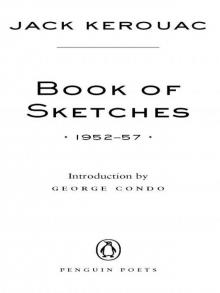 Book of Sketches
Book of Sketches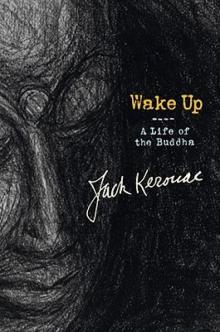 Wake Up: A Life of the Buddha
Wake Up: A Life of the Buddha The Electrocution of Block 38383939383
The Electrocution of Block 38383939383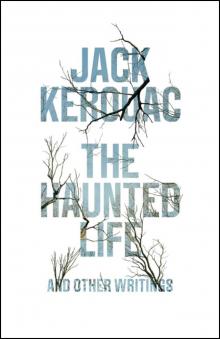 Haunted Life
Haunted Life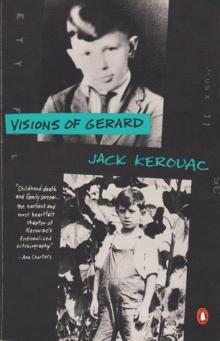 Visions of Gerard
Visions of Gerard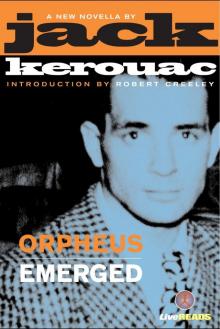 Orpheus Emerged
Orpheus Emerged Book of Blues
Book of Blues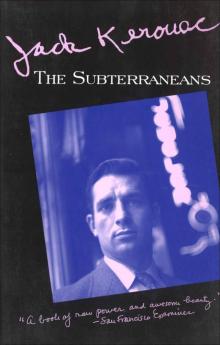 The Subterraneans
The Subterraneans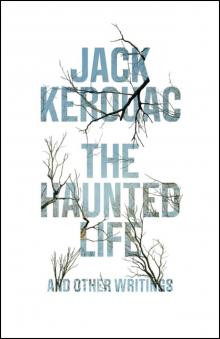 The Haunted Life
The Haunted Life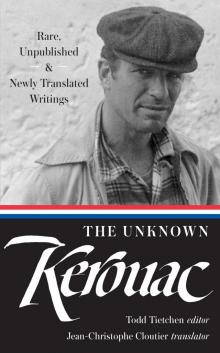 The Unknown Kerouac
The Unknown Kerouac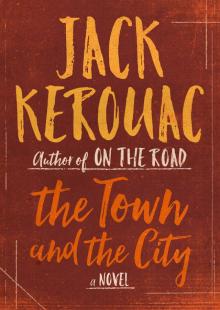 The Town and the City
The Town and the City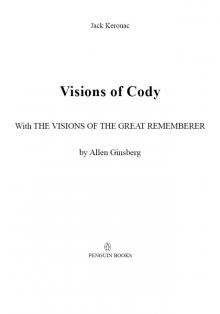 Visions of Cody
Visions of Cody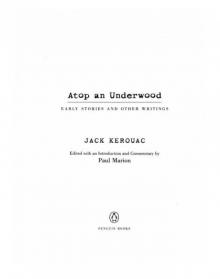 Atop an Underwood
Atop an Underwood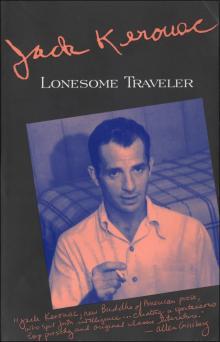 Lonesome Traveler
Lonesome Traveler Jack Kerouac and Allen Ginsberg
Jack Kerouac and Allen Ginsberg Vanity of Duluoz
Vanity of Duluoz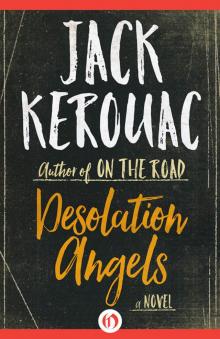 Desolation Angels
Desolation Angels On the Road: The Original Scroll: (Penguin Classics Deluxe Edition)
On the Road: The Original Scroll: (Penguin Classics Deluxe Edition)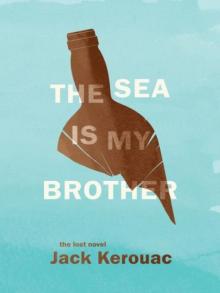 The Sea Is My Brother: The Lost Novel
The Sea Is My Brother: The Lost Novel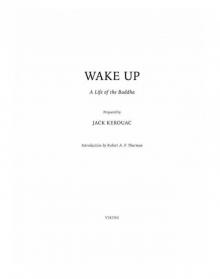 Wake Up
Wake Up The Poetry of Jack Kerouac
The Poetry of Jack Kerouac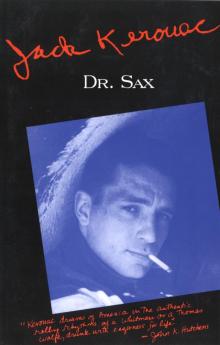 Doctor Sax
Doctor Sax